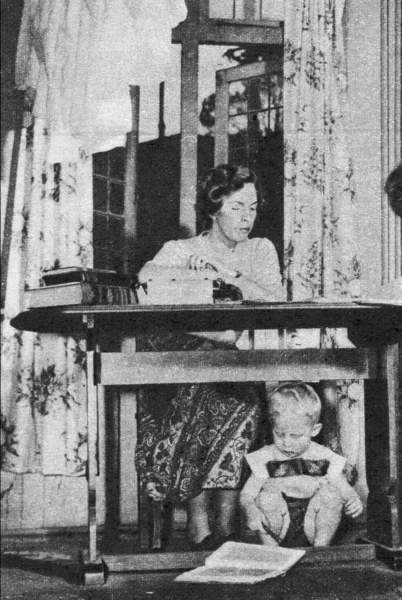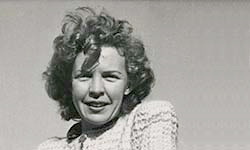On Writing
Ruth Park was the author of Harp in the South which was awarded the prize of £2,000 in the first Sydney Morning Herald novel competition in 1946, and which raised such a hullabaloo as is rarely known in journalism.
The light-hearted piece reprinted below, is an article written by Ruth Park in 1949, describing how the writer develops literary characters when working on a novel.
AN AUTHOR IN SEARCH OF A CHARACTER
by Ruth Park
Yes, I know. I know the average writer doesn't work on a kitchen table with a Kosciusko of pea-pods at one elbow, and a chook's ghastly cold claws sticking out front under his notes. I know he doesn't sweat through a crucial chapter with a small child busy under his chair-putting his feet to sleep in a doll's bed.

Neither does he burn saucepans between sentences, or leave his heroine with her eyes closed, waiting for that protracted and crucial kiss, while he tears off to poke the clothes down in the copper. He does the job sensibly. In the same way, I humbly suppose, he builds his characters with dignity, contemplation, and in solitude.
But not me. Not the housewife. Not for me the building of a character brick by blasted brick. To get my imaginary people I go straight out to the wholesaler's. And what a job he's made of them! Those old men in the fruit market, with faces like shiny russet pears! Those splendid fellows who wear sacks for hats, and hump great baskets of bones out of the butcher's! Those radio announcers with three massaged chins apiece! Those bus conductresses with bobby-socks and earrings!
You could write a book about any one of them.
This is where I find my characters, in shops and streets. When I was little, my Grandma used to call me a great fladdy faced gawk, and I feel this is my greatest dowry as a would-be novelist. I like to gawk and listen, and for this reason I am frequently prodded by some irate matron I don't know, and asked: "You still got your big ear cocked?"
Nor am I any stranger to the drunk who, taking my entranced gaze as evidence of some mysterious passion for himself, pleases the entire tram with a recital of why I wouldn't suit him.
Yes, first of all I like to find a face for my future character. I feel that the physical characteristics of anyone, real or fictional, are most important. You've got to know whether his legs will bend, or if he suffers from rheumatism or deafness, because a person with these diseases is going to react quite differently to the life and experiences you give him from the way he'd react if he were a doctor's white mouse.
Once I've found the body my character is going to wear, I think about him. I think about him till I feel that he's a relative who won't go home.
Peeling a potato down to the size of a grain of rice, I puzzle why his mouth puckers this way, or his eyebrows that. And, putting too much salt into the soup, I find out, because just as you cannot expect violin sounds from a trombone, so you cannot expect a mature face to be anything but what the soul and mind inside make it.
Soon I feel that the moral character I have worked out for this man is, if not quite accurate, at least reasonable. That's the main thing. You can never twist a character to fit in with your plot. If you do, you are drummed out of the literary world, and have all the keys of your typewriter cut off.
No, you've got to shape the character as honestly, and as nearly perfectly as you can, and then introduce the fellow to the plot. He'll make his own action. Most likely he'll improve on your original idea. Hughie Darcy was this sort of a character. He was the drunken ne'er-do-well father of a poor family in my first book, "Harp in the South."
Surry Hills is full of his kind. I watched Hughie going home from work, hundreds of Hughies, blue shirts, stubbled faces, black hands, eyes bloodshot from dust and sleeplessness in some verminous hovel.
Some of these Hughies were young, and others elderly, but they were all the same man at different stages of his life, pressed into a mould of fatigue and despair, walloping along on the leaky raft of the basic wage, with every new kid forcing it deeper into the water. Hughie was going to be the villain of my book, the man who drank the rent and the food, and whose feeble efforts at self-improvement were no more than pebbles on his downward slide. But instead of that Hughie came to be the major character, not the villain, but a weak and essentially lovable man confronted with a villain, which was the treadmill existence he had no hope of escaping.
He could be criticised, and so could his circumstances, but I don't think criticism is the vocation of the novelist. If you understand, and present the character as he is, the reader will do all the necessary criticism of him and his type.
Of course sometimes a character baulks at some incident, and you've got to delve deeper and deeper into his workings before you can rationalise the business. This is where the housewife-writer has it, all over the professional novelist. She can go away and do the laundry, and meditate over the snag, and most likely by the time she wakes up she is both starching the socks and already in her mind rewriting that difficult chapter.
The last lap is to find a suitable name for your character. Sometimes this is incredibly difficult. I read the telephone book for surnames, and try each one out with all possible sorts of Christian and nicknames. The right name for a character rings a bell, a loud triumphant bell, and the wrong name is a mental jar, as aggravating to the writer as if he himself were continually addressed by some annoying nick-name belonging to someone else.
I am having this trouble at the moment. I have just concluded another novel, and the heroine is, I regret, still called nothing but "Thingummy."
Copyright © 1949 Ruth Park.
